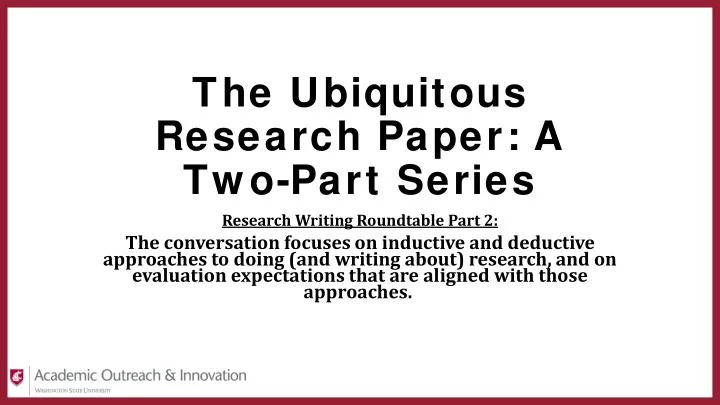

The Ubiquitous Research Paper: A Two-Part Series Research Writing Roundtable Part 2: The conversation focuses on inductive and deductive approaches to doing (and writing about) research, and on evaluation expectations that are aligned with those approaches.
Overview • Review of Pt I ‒ Research Process Types ‒ Combination of research process types • Developing rubrics based on research process type(s) selected • Your research process type and teaching • Peer review based on research process type • Yes/no, right/wrong components • Questions
Peer Review • In addition we will discuss effective strategies for engaging peers in the process of determining for themselves and others if they are meeting the expectations set out for them.
Research Process Types • Inductive Research Process • Informative/Report Process • Deductive Persuasive or Argumentative Essay Process • Report leading to Inductive Question leading to Deductive Conclusion
Combined Research Process Types • Inductive leading to deductive • Inductive leading to informative/report • A researched report leading to inductive • Deductive leading to inductive • Researched report leading to deductive • Deductive leading to a researched report
YOUR RESEARCH/YOUR TEACHING • Take a minute to consider your research process and your writing process. Use the symbols to map out how these processes work for you. • What parts of the research process are you most interested in having your students practice? • In the next research assignment you create for your students, what structure(s) might you use?
Inductive Rubric Inductive Research Struggling Achieving Mastering TOTAL Process Starts with a “good” 40 question Uses data and ideas as 30 evidence to answer the question Applies knowledge to 20 reach a conclusion Analyzes and 20 interprets data and ideas from experiment and/or sources Reaches a result that 40 creates new knowledge TOTAL: 50 100 150 150
Informative/Report Rubric Informative/Report Struggling Achieving Mastering TOTAL Process Has a “good”, focused 40 topic Summarizes relevant 30 literature data and ideas Presents analysis and 30 interpretation of others TOTAL: 50 80 100 100
Deductive Research Rubric Deductive Research Struggling Achieving Mastering TOTAL Process Take a stance in the 40 form of a “good” thesis Addresses audience 30 appropriately Uses logic as primary 20 but not only rhetorical appeal Includes unique 20 perspective and conclusion of arguer Applies known evidence 40 and knowledge to reach a conclusion TOTAL: 50 80 100 100
Combination Rubric Report leading to Inductive Questions Struggling Achieving Mastering TOTAL leading to Deductive Conclusion Reports information in 40 the form of exposition, review, and summary Questions that is asked 30 clearly emerges from summary and review Analyzes and interprets 20 data and ideas and draws conclusion Takes a stance in the form 20 of a thesis Reiterates data and 40 evidence as proof of thesis TOTAL: 50 100 150 150
Peer Review Components • Peer review is best when it starts with observation and not evaluation.
Observational Peer Review Inductive Research/Informing Deductive What is the question that the What is the topic? What is the topic? research is asking? What kinds of data is used as evidence to answer the Locate the analysis and Locate the analysis and question? interpretation of others. interpretation of others. What is the conclusion that is Locate areas of summary. Locate areas of summary. reached? Locate and identify place where the document interprets data and ideas from experiment and/or sources What is the new knowledge that is presented?
Peer Review Components • Peer Review at the more sophisticated levels includes evaluation.
Evaluative Peer Review Deductive Research/Informing Inductive Is the thesis focused enough for Is the research question focused Is the scope of the topic the scope of the project? or narrow enough for the scope appropriate? of the topic of study? Are the rhetorical appeals Is the analysis and effective? Are the kinds of data and interpretation of others Is the perspective of the author evidence used to answer the explained fully? (as compared to other scholars) question adequate? Are the areas of summary presented in a believable way? coherent? Does the conclusion that is reached follow logically from Is the evidence that supports the proposition? the thesis actually succeeding? Is the new knowledge that is presented actually new?
The things left out of the rubrics • Now let’s add the things left out of the rubrics
The things that are right or w rong: • Grammar • Citation Conventions Consider using a neutral to negative rubric for these components that have less to do with research and more to do with performance: Point deductions should be decided based on context, draft, and goals of the course. Deduct points Deduct points relative to perceived relative to perceived Zero (neutral) worth worth Grammar Lots of Modest No or few mistakes mistakes mistakes Citation Lots of mistakes Modest mistakes No or few mistakes Is meaning affected? Is professionalism affected?
The “yes” or “no” (did it or didn’t things) No Yes Met page length requirement Has a title Uses citation style appropriate to discipline Uses # of required sources Works Cited is included
Questions? What questions do you have about today’s topic?
Contact Lisa Johnson lisaj@wsu.edu Undergraduate Writing Center CUE 303 Contact aoi.li@wsu.edu or go to aoi.li.wsu
Recommend
More recommend